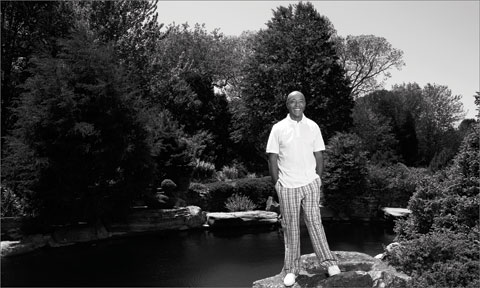He is so much more than just a man; he is a brand. He is the face of the hip-hop culture-he virtually founded the industry with his Def Jam Recordings. He is Def Comedy Jam, Rush Philanthropic Arts Foundation, Argyle Culture, and The Simmons Jewelry Company. Russell Simmons is a force to be reckoned with, an astounding businessman presiding over a multi-million dollar empire that spans industries and defies characterizations, just as he does. Because Simmons, despite being one of the most well-known and respected leaders in a world that idolizes the almighty Benjamin, is as grounded as they come-a walking contradiction.
It could be attributed to his yoga, which he began practicing daily 14 years ago. “Yoga is so soothing, the practice of moving with a smile,” he says. “You can accomplish a lot more with grace and peace than with frustration and anxiety.” He begins every day by doing physical yoga, which he describes as the practice of stillness, one step on his constant strive to reach the “state of yoga.” Being still must be hard for a man nicknamed “Rush” thanks to his fast-paced approach to just about everything. But he is working on a path that follows the Eight Steps of Yoga, which has affected every facet of his life. Here, we outline how those steps have allowed Simmons to expand his company into an unstoppable international force.
1: Yama
Asks that students of yoga engage in ethical behavior, truth , non-violence , non-stealing, and avoid over -indulgence for self -satisfaction
Simmons began his practice of yoga when he was 35, and has since been on the unending path to enlightenment. The basic philosophies behind the ancient practice have infiltrated his life and his life choices. The mogul, whose first business endeavors involved hustling on the streets of his native New York, may not have always engaged in the most ethical businesses nor business practices in the early years of his career…if you can call running with the gang Seven Immortals a career. In 1977, he found his true calling: hip-hop. He abandoned his life of crime and became a concert promoter and manager, working night and day to get some of the first rap singles on the radio.
His big break can be attributed to close family ties: he co-produced Run-DMC, the rap group that included his younger brother, Reverend Run, who is currently starring in an MTV reality show called Run’s House. In 1985, Simmons co-founded Def Jam Records with his partner Rick Rubin. The label produced some of the biggest rap stars of the time, including Public Enemy, Beastie Boys, and LL Cool J. While this era was not filled with the most ethical behavior-wild parties were part of his group’s cadre-it led Simmons to the wealth that is sometimes necessary to make a difference in the world. He has been famously
quoted as saying, “It’s hard to help the poor if you are one of them.” He sold the second-half of his shares of Def Jam in 1999 for $120 million. In the midst of running Def Jam, Simmons began Rush Communications, an umbrella company for all of his business ventures. “All of my businesses are based on trying to be of good service to the community,” he explains. The “community” to which he refers is the hip-hop sector. “Everything my companies have done is based on the hip-hop culture,” he explains, “whether it is Def Jam, Phat Farm [clothing line], or Def Comedy Jam [original entertainment on HBO]. It is done with attention to the subtlety of marketing hiphop on a global scale. I think it’s something we are very good at. My whole career has been about cultivating, understanding, and expanding this core audience of hip-hop culture and then watching the impact ripple out into the mainstream.”
2: Niyama
The path of self -discipline, which asks that students of yoga keep their bodies and minds clean, asks that they do their best in every endeavor, and asks that certain pleasures be passed up in order to achieve the goal
When Simmons discovered yoga, he found discipline. He follows a strict vegan diet. His office style has been described as “attention-deficit-disorder-as-management,” although he claims that practicing yoga has had a positive affect on his empire. “I think we do a little better at Rush Communications because of my practice,” he says. “All of us are more calm-there are less problems with the boss.” He says this with a laugh. As someone who is known for his lack of ability to sit still, it is no doubt this calmness was needed in the office to help propel his business, which has really exploded in the past decade.
His conglomerate now includes fashion lines Run Athletics and Argyle Culture; film company Latham Media Group; television shows Def Comedy Jam and Russell Simmons Presents Def Poetry; Tony Award-winning Broadway show Russell Simmons Def Poetry Jam on Broadway; financial services with UniRush and its RushCard; jewelry with The Simmons Jewelry Company; video gaming; mobile communications; among other ventures. He sold his fashion line Phat Fashions, which includes Phat Farm and Baby Phat, to Kellwood in 2004 for $145 million.
The new Argyle Culture line exemplifies the Rush Communications mantra of doing their best. Simmons describes the line as for the “Urban Graduate,” appealing to those that grew up in the hip-hop culture, but are a little too old to rock Phat Farm attire, citing Will Smith, Adam Sandler, and Barack Obama as prime examples of his target market. “They are not from Greenwich, Connecticut,” Simmons explains. “They are from hip-hop. They want a different thing. So we are serving them that way.”
3: Asana
The physical practice of Asana yoga is made up of 85 physical postures and performed to strengthen the body, increase health, and prepare for meditation
When Rush is at his condo in the city, across from Ground Zero, he rises early to go to Jivamukti Yoga, a vigorous physical and intellectually stimulating practice leading to spiritual awareness. “Yoga, the physical practice, is one that focuses on alignment,” Simmons explains. “The physical practice I do is mostly Juvamukti-inspired, which is where I go in New York. But I can do the physical practice anywhere.” The 90-minutes Simmons spends practicing every day results not only in a sound body, but also in a sound mind.
Simmons also chairs the Hip-Hop Summit Network, which is dedicated to harnessing the cultural relevance of hip-hop music to serve as a catalyst for education advocacy and other societal concerns fundamental to the empowerment of youth.
While yoga may have allowed the seemingly unstoppable mogul to slow his frantic pace, after competing his physical practice, Simmons heads to the staging ground for Rush Communications. Replete with expansive views of midtown Manhattan, Rush Communications is the base for his conglomerate, where he heads up his expanding empire.
That empire recently launched GlobalGrind.com, an online portal for multi-media content. Users can discover the latest in music, entertainment, hip-hop, culture, nd more, while interacting with other GlobalGrinders.
4: Pranayama
Breathing and the control of the vital breath force , boosting one’s health and concentration
In order to run such a successful business that spans so many different markets, that aforementioned ADD-style is needed. A typical day in the life of Simmons would run the standard businessman ragged, but Rush’s unflagging energy and knack for self-control fuels his conglomerate. The day before we met with Simmons at his home in the Hamptons, he spent the morning juggling filming scenes for Run’s House at the Rush Communications headquarters, along with television, radio, and print interviews about a barrage of subjects.
After the interviews, he met with executives about his jewelry line, followed by a meeting with his ex-wife Kimora Lee, head of Baby Phat, where the two discussed he clothing line as well as their two children, Ming Lee, 8, and Aoki Lee, 5. Despite the broad range of sectors his business covers, he explains that “all of the markets are synergistic….The cross marketing that I do with other brands speaks to a community’s strength and helps build emotional connections between that product and those people. I am just not that good at selling frivolous products.
“[Outside of our fashion lines] our businesses move toward things that are service-orientated in many ways,” he says. “We want to give people things that make them happy and lead to more lasting and stable forms of happiness. We want to promote things that are really useful.
“Everybody can sell something that makes people happy,” he continues. “A drug dealer is happy when the sale goes down and so is the addict. But the dealer himself dies before the addict. So with this kind of philosophy I have to remember that I want to sell not only things that people want, but also sell things that I feel comfortable with, things that I want them to have that will make them happier and more enlightened people.”
5: Pratyahara
Turning inward, releasing the ego and the senses
“It’s kind of funny,” he says. “I’m in film and television, jewelry, and financial services, but the main thing I have is philanthropic and social.” Simmons is the chairman of the Rush Philanthropic Art Foundation, which he co-founded with his brothers Danny and Joseph, a.k.a. Reverend Run. The foundation serves to provide disadvantaged youth with significant exposure and access to the arts, as well as provide exhibition opportunities to under-represented artists and artists of color. The recent Art for Life Miami Beach event, held at the Bath Club on April 5, raised more than $200,000 for the cause. Art for Life East Hampton is set to take place at Simmon’s Hamptons estate on July 19.
He often uses the property for philanthropic events. “I’ve had the property for nine years,” he explains. “It’s a safe haven.” Simmons heads to the property to get away from the rigors of his city life. “I have a routine here. It helps me escape. Although when your head is ready, it doesn’t matter where you are, but it’s nice to have a place to go for that.”
Simmons also chairs the Hip-Hop Summit Network, which is dedicated to harnessing the cultural relevance of hip-hop music to serve as a catalyst for education advocacy and other societal concerns fundamental to the empowerment of youth. Simmons also serves as chairman to the board of the Foundation for Ethnic Understanding, which promotes racial and religious dialogue. He manages to juggle that with his role as chairman of the Diamond Empowerment Fund, a program to help disadvantaged Africans. He is a member of the Happy Hearts Foundation and “on quite a few other boards,” he explains. “So I definitely spend a great part of my time on my philanthropic endeavors,” which has aided the mogul in letting go of his ego to aid others in need.
6: Dharana
Concentration of the mind, a necessary step for meditation
Recently, Simmons has concentrated his marketing efforts on the promotion of the soft-cover Do You!: 12 Laws to Access the Power in You to Achieve Happiness. “My book is one of my great contributions,” he explains. “People tell me that it changed their life, their consciousness. That is even greater than charity. Opportunity is good and empowerment is good, bigger than charity. But nothing is bigger than consciousness.”
The New York Times book review by Harry Hurt III asserts that “the most compelling of his 12 laws is the titular dictum ‘Always do you.'” This is something that Simmons always does. He is always himself, he is always rushing, and he is always searching for a new way to make the world a better place.
7: Dhyana
Meditation, the principle practice of yoga
Every morning upon waking, Simmons takes the time to meditate on his life and his businesses. It is part of his routine, something that helps him face the rigors of his busy life as he strives to reach the mental state of yoga. He explains, “The state of yoga is a desired state of connectedness. A state of needing nothing. That’s the idea.” When he is in the Hamptons, that meditation may be followed by a quick dip in the ocean, despite frigid temperatures. “It’s something I do,” he says, unabashedly. Simmons is always doing whatever comes naturally to him and, to his credit, most projects he takes on have a way of working out for the greater good.
8: Samadhi
Transcendence , a super conscious state : the ultimate purpose of yoga
“Am I in a state of yoga all the time?” Simmons ponders. “No. But I am more connected. I am closer to a comfortable state. I changed a little bit. I am just more comfortable in my skin.” Which is all anyone on the path to enlightenment can hope for.





















